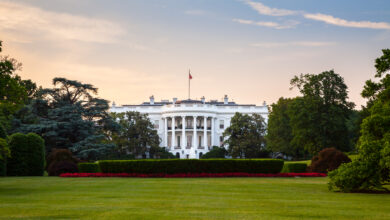The Oh-Snap Edition: My Tariffs Are Bigger Than Yours

A quick look at the headlines this week 👀🏃🏻♀️
- Trade: U.S.-China trade talks ended without a deal. As promised, the U.S. increased tariffs on $200 billion of Chinese goods, and Beijing retaliated with new tariffs on $60 billion of U.S. goods. #FunTimes
- Mr. Orban goes to Washington: Hungarian prime minister, Viktor Orbán, visited the White House on Monday. Why is that a big deal? Well, he’s an authoritarian.
- Philippines: In general elections for the legislature in the Philippines on Monday, May 13, nine candidates loyal to President Rodrigo Duterte won. Twelve seats were up for grabs.
- Iran: Iran’s leaders threatened to violate parts of the Joint Comprehensive Plan of Action (JCPOA) aka Iran Nuclear Deal.
- EU Parliamentary elections: Next week, 374 million people in 28 countries across Europe will cast votes for 751 seats in the European Union Parliament. The far-right populists are expected to do well.

He said he tried. After complaining about the U.S. trade deficit with China and how China takes advantage of America, Donald Trump hit China with a $53 billion tariff on steel and aluminum in January 2018. Next, he hit Chinese solar panels and washing machines. When September 2018 rolled around, he handed Beijing a $200 billion tariff bill. China reciprocated with its own tariffs on U.S. goods, such as soybeans. A trade war was born.But wait! Following last December’s G20 Summit in Argentina, Trump and China’s President Xi JinPing agreed to call a truce and sit down for talks. Those talks fizzled out last Friday. Cue the tariffs. The U.S. increased tariffs on $200 billion of Chinese goods, and Beijing retaliated with $60 billion in tariffs on U.S. products. Oy vey.
- China put out the requisite statements about not surrendering to “extreme pressure” from the United States. Lauren Teixeira thinks that tempered. She explains why China isn’t turning nationalism up to 11 — yet. (Foreign Policy)
- What comes next for China in the trade war with the U.S.? Jessica Chen Weiss highlights three things to watch: nationalist propaganda, creative solutions to end the stalemate, and anti-American boycotts and protests. (Washington Post)
- Trump fights China on trade, but surrenders on human rights, says Frida Ghitis. This is especially true with the country’s repression of the Uighurs, a Muslim minority in China’s northwest. (CNN)
- Developing countries in Asia have more cause for concern than the U.S. when it comes to China’s trade patterns, writes Jayati Ghosh. (Project Syndicate)
- After China, will the EU be the next target of Trump’s tariffs? Marie Kasperek explores. (Atlantic Council)
China isn’t only investing in ports in the developing world, it is investing in commercial in Europe and the Americas. Eleanor Albert reports. (The Diplomat)
Iran
Things heated up this week, as Iran’s leader, Hasan Rouhani said that his country would start stockpiling extra low-enriched uranium. He also outlined a proposal that would end U.S. sanctions on Iranian oil or redraft a new deal. This pushes the European Union, which continues to be a signatory to the JCPOA, aka Iran Nuclear Deal, up against the wall. Does the EU push back on the U.S. and does it work out a new deal with Tehran? Watch this space.
- Iran is losing its patience, but holding back and staying in the nuclear deal would allow it to keep the moral high ground and international support, Aniseh Bassiri Tabrizi argues. (Foreign Policy)
- Gulf states are sabotaging Trump’s campaign against Iran — and their own security, say Mary Beth Long and Sigurd Neubauer. (Haaretz)
- Iran’s leaders threatened to walk away from the JCPOA, but don’t misread its actions, says Mahsa Rouhi. Iran isn’t so much interested in unraveling the JCPOA. It just wants to make clear that the status quo, in which the country endures maximum pressure without any tangible benefit in return, is no longer sustainable. (Foreign Policy)
Trump fancies himself a great negotiator, but he is at risk of losing deals with China, Iran, and North Korea, writes Kimberly Ann Elliott. (World Politics Review).
The U.S. needs a gray zone strategy to counter North Korea’s provocations effectively, argue Duyeon Kim, Nicholas D. Wright, and Kristine Lee. (Foreign Policy)Mr. Orbán goes to Washington
World leaders call on the White House regularly. Not a big deal, unless you’re an autocrat that denies freedoms in your country. This week’s visit by Hungary’s prime minister Viktor Orbán was brow raising in that it happened at all. Coming to the White House was once considered a privilege; a great honor bestowed upon allies. Today, it seems it’s a meeting of minds. Sigh.
- By hosting a meeting with Hungarian prime minister, Viktor Orbán, Trump has handed a victory to yet another authoritarian leader, say Anne-Marie Slaughter and FPI Fellow Melissa Hooper. (Project Syndicate)
- Kim Lane Scheppele writes that Trump and Orbán’s meeting is unlikely to bring Hungary into closer alignment with U.S. foreign policy, but it could be a chance for Orbán to convince Trump to back his plans for the EU. (Foreign Affairs)
You can read the entire issue of FP Interrupted here. To subscribe to FP Interrupted, click here.




